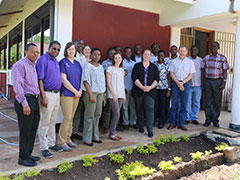January 18, 2018
CVM faculty journey to Tanzania for third workshop in OIE Veterinary Education Twinning Project

In November and December 2017, six Kansas State University College of Veterinary Medicine faculty and staff had the opportunity to visit Sokoine University of Agriculture, or SUA, and its College of Veterinary Medicine and Biomedical Sciences in Tanzania as part of a World Organisation of Animal Health, or OIE, Veterinary Education Twinning Project between the two colleges.
The goal of this project is to promote partnerships between universities that lead to exchange of ideas and opportunities, which ensure future veterinarians are prepared for challenges in promoting global animal and public health.
During this most recent workshop in Tanzania, faculty from K-State and SUA discussed a variety of topics and project activities that promote these goals. Among these topics were curriculum, continuing education, research collaborations, student and faculty exchanges, and equine medicine lectures and practical exercises. Peggy Schmidt, Katie Delph, Katie Reif, Mike Sanderson and Tesfaalem Sebhatu and project administrator Rachel Reichenberger represented K-State during this workshop.
Schmidt presented a curriculum review matrix developed for mapping veterinary curriculum to the OIE's "Day 1" competency standards. These standards consist of skills and knowledge recommended for graduating veterinarians to have in order to support their national veterinary services. The tool developed by Schmidt will be used to identify curricular gaps related to the OIE Day 1 Competencies at SUA.
"I had extensively reviewed documentation of SUA's BVS curriculum prior to our visit in November, but paper cannot capture the heart of a veterinary training program," Schmidt said. "Touring the facilities, speaking with faculty, and interacting with students really brought their program to life. The OIE Veterinary Twinning Project is a wonderful opportunity for programs SUA and K-State to learn from each other, and in the end, enhance student training at both institutions."
The curriculum mapping results are expected by the end of 2018, and SUA faculty will conduct a gap analysis from these results.
Another goal of the project is for SUA to host a continuing education course in 2019 that will promote the development of a robust continuing education program for Tanzanian veterinarians. Sanderson chaired the discussion between SUA faculty to plan for this course.
During the workshop, participants considered other potential activities and collaborations for the twinning program. Reif assisted in the development of a matrix outlining mutual research interests amongst faculty at both universities.
"The overwhelming collective goal of researchers at K-State and SUA is to identify innovative solutions to combat global health challenges," Reif said. "With several shared areas of research interest including: vector-borne and transboundary animal diseases, antimicrobial resistance, neurodegenerative diseases and several others, there are numerous opportunities for K-State and SUA faculty to engage in collaborative research projects. Leveraging combined resources, research partnerships between both colleges would readily benefit from: access to unique sample material, access to specialized equipment and infrastructure, exchange of expertise, and student and faculty training opportunities. Personally, I am very excited to develop a research collaboration with SUA faculty and have plans to submit a joint research proposal on combating tick-borne diseases of livestock this spring."
Details of student and faculty exchanges were also discussed at the workshop. Exchanges at both universities are included as part of the Twinning Project to promote student learning in different environments.
Because equine medicine had been identified by SUA faculty as an area of interest, Delph provided relevant lectures and practical experiences for the Tanzanian students. Her lectures also provided a foundation to help SUA faculty enhance this area of expertise.
"It was my pleasure to teach the fourth-year veterinary students at SUA during the Twinning Project," Delph said. "Working donkeys make up a large part of the equid population in Tanzania, and the veterinary students were extremely receptive to learning and practicing equine medicine."
She added, "Training veterinary students in equine medicine and husbandry will help to improve donkey health and welfare in the country through owner education. It will be exciting to help train SUA faculty members so that this information can be implemented in the curriculum for future classes and be a benefit to their communities."
Work is scheduled to continue on each of these activities for the next few months, and progress will be assessed at the next project workshop to be hosted at the K-State College of Veterinary Medicine in summer 2018.
